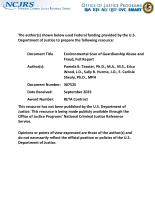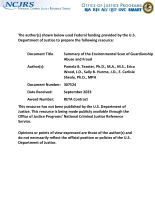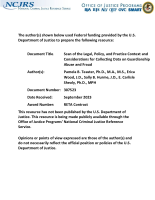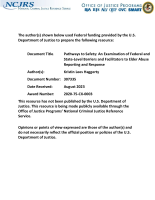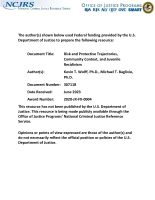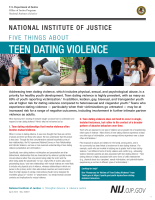Adults (18+)
Summary of the Environmental Scan of Guardianship Abuse and Fraud
Scan of the Legal, Policy, and Practice Context and Considerations for Collecting Data on Guardianship Abuse and Fraud
Meeting the Ongoing, Urgent, Unmet Needs of Uvalde Residents After the Robb Elementary School Shooting
Elder Abuse Survivor Equity (EASE) Study: National Longitudinal Trajectories and Translation for Practitioners and the Public
Synthetic patient-specific whole-body CT for the calculation of Peripheral Dose During Radiotherapy
Assessing Solvability Factors in Missing Person Cases: A Mixed-Method Approach
Cannabis liberalization policies and trends in cannabis-related school-based discipline: Examining sociodemographic disparities in Massachusetts
When State Violence Comes Home: From Criminal Legal System Exposure to Intimate Partner Violence in a Time of Mass Incarceration
Pathways to Safety: An Examination of Federal and State-Level Barriers and Facilitators to Elder Abuse Reporting and Response
Bias Crime and Victimization Among Latinx Adults: Formal and Informal Help seeking
Investigating the impact of age-depended hair colour darkening during childhood on DNA-based hair colour prediction with the HIrisPlex system
Blunt Force Trauma in the Human Mandible: An Experimental Investigation
Adults' Memory for a Maltreatment-Related Childhood Experience: Interview Protocols
Facets of social support are differentially predictive of mental health outcomes
Sources and Types of Social Supports and Their Association with Mental Health Symptoms and Life Satisfaction among Young Adults with a History of Out-of-Home Care
Snitching Versus Reporting: A Qualitative Analysis of Barriers and Facilitators to Addressing Safety Concerns Among high School Students
Hate Crime and Bias Victimization of Latinx Adults: Rates From a Multisite Community Sample
Paleodemography: From Archaeology and Skeletal Age Estimation to Life in the Past
An Introductory Examination on the Differences Between Frequentist and Bayesian Multiple Regression Using Real-World Data on Bias-Based Victimization Among Latinx Adults
Estimating Age of Death from Subadult Remains, Part 1
The long-standing problem of estimating the age and sex of subadult skeletal remains has been significantly "solved" with the advances in understanding the growth and development patterns in the skeletons of young people. Kyra Stull, an anthropologist and forensic researcher at University of Nevada, Reno, and Danielle McLeod-Henning, a physical scientist at NIJ, share more about this research with NIJ writer and host Jim Dawson.


